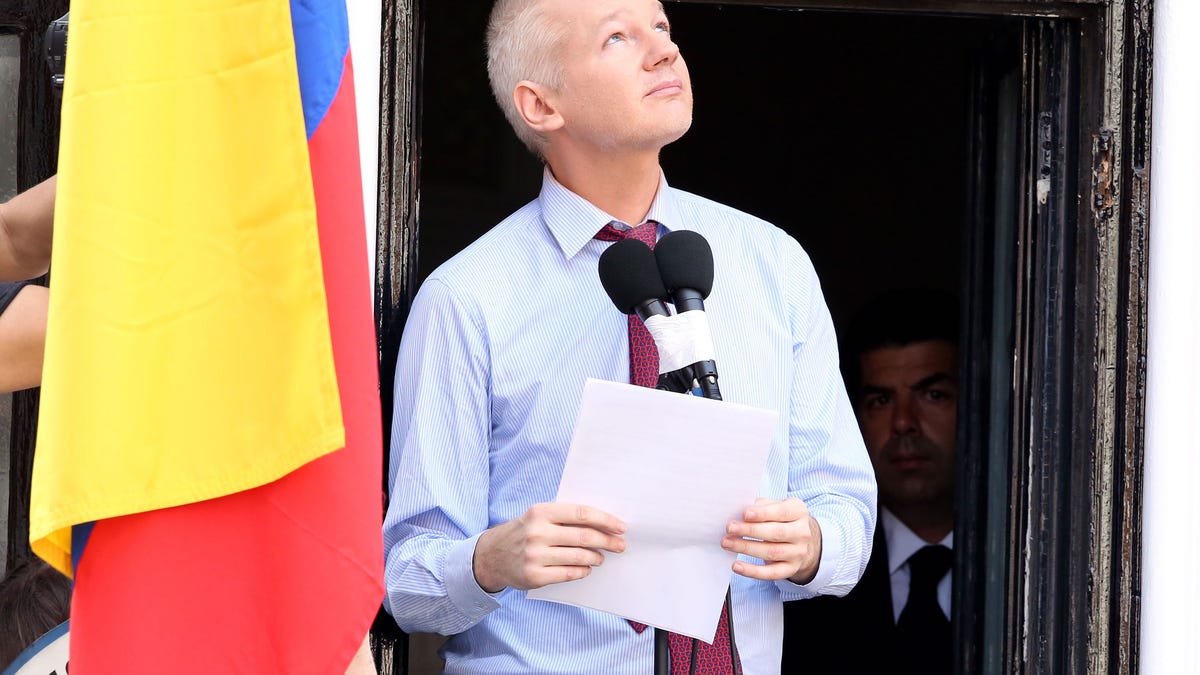Julian Assange wins UN ruling on arbitrary detention, but still faces arrest
A UN tribunal has ruled the WikiLeaks founder should be allowed to walk free, but the UK government says he will still be arrested should he leave the Ecuadorian embassy.
Julian Assange is set to feel sunlight on his face again -- but perhaps not for long.
The founder of WikiLeaks has been backed by the UN to leave the Ecuadorian embassy in London that has been his home for the past three and a half years, where he sought to avoid arrest and extradition to Sweden over charges of rape.
The United Nations human rights tribunal ruled that his stay in the embassy represented arbitrary detention, or being detained without due legal process. The tribunal ruled on Friday that Assange is entitled both to his freedom of movement and to compensation for his confinement.
But the UK government disagrees with the ruling and is still poised to arrest Assange should he leave the shelter of the embassy building. "This changes nothing," said a government spokesperson in a statement. "We completely reject any claim that Julian Assange is a victim of arbitrary detention."
The UN ruling is significant enough that Assange announced he would end his exile one way or the other. In a statement on the WikiLeaks Twitter account, he acknowledged that beyond the UN panel there is "no meaningful prospect of further appeal." If the tribunal had ruled against him, he said in a statement on Thursday, he would walk out of the Ecuadorian embassy at noon on Friday to accept arrest. But with the ruling in his favour, Assange and his legal team called for the return of his passport and the end of any attempt to arrest him.
It's the latest twist in the long-running saga of the 44-year-old Australian who rose to prominence when his site leaked thousands of classified government documents relating to the Iraq War, a source of embarrassment for the US. He sought sanctuary at the Ecuadorian embassy because of his concern that his extradition to Sweden, where he is accused of rape, would lead to extradition to the US, where he could be prosecuted for the leaks.
Assange has been ensconced in the small Ecuadorian embassy building since May 2012, faced with arrest if he steps outside. Assange claimed this amounts to arbitrary detention, and the UN Working Group on Arbitrary Detention (UNWGAD), a panel of five human rights experts, agreed.
Assange: I will accept arrest by British police on Friday if UN rules against me. More info: https://t.co/Mb6gXlz7QS pic.twitter.com/mffVsqKj5w
— WikiLeaks (@wikileaks) February 4, 2016
Assange petitioned the UN last year. One member of the five-person panel recused herself, and the decision went three-to-one in Assange's favour, with one member stating that Assange had voluntarily placed himself into exile to avoid arrest. The panel communicated its decision to the British and Swedish governments on 22 January
The UNWGAD stated that Assange was unlawfully detained in three stages: his initial detention in Wandsworth prison after first being arrested, followed by house arrest and then by his confinement at the Ecuadorian embassy. The tribunal concluded that the detention was arbitrary "because he was held in isolation during the first stage of detention and because of the lack of diligence by the Swedish prosecutor in its investigations".
But although the ruling is based on the European Convention for Human Rights and other international treaties, the UN panel has no formal authority over either the British or Swedish government. "The opinion of the UN Working Group ignores the facts and the well-recognised protections of the British legal system," insists the UK government, claiming Assange is, "in fact voluntarily avoiding lawful arrest by choosing to remain in the Ecuadorean embassy."
The UN human rights body has released a video explaining how the UNWGAD works, which insists that a ruling would be legally binding, if only "indirectly".
Assange case & Working Group on Arbitrary DetentionsWe will release tomorrow morning, 9am CET, the opinion of the UN Working Group on whether Julian #Assange is being arbitrarily detained. We cannot confirm any other information before then. Many people are asking what this Working Group is, how it works, and whether its opinions are legally binding. We put together this video to clarify these points. Send us your questions!
Posted by United Nations Human Rights on Thursday, 4 February 2016
While two initial sexual assault charges against Assange have been dropped, a European Arrest Warrant is still outstanding for the charge of rape.
A warrant for Assange's arrest was first issued by Swedish prosecutors in 2010. In 2012, the Supreme Court, the UK's highest legal body, ruled that he should be extradited to Sweden, and shortly afterwards he claimed asylum in the Ecuadorian embassy in the Knightsbridge area of London. Assange has been holed up inside the 30 square meter building ever since, living in a small converted office with a bed, a treadmill and a sun lamp, with no access to outside space. British police stood guard outside for much of that time, at a reported cost of more than £10 million.
Visitors to the embassy have included the artist Yoko Ono and her son, the musician Sean Lennon; fashion designer Vivienne Westwood; pop stars Lady Gaga and MIA; and actors John Cusack and Maggie Gyllenhaal.
During his exile, Assange inspired the movie "The Fifth Estate", in which he was played by Benedict Cumberbatch, and the thinly disguised BBC sitcom "Asylum".
Update, Friday 5 February: This story was originally published on Thursday 4 February, and has been updated with details of the UNWGAD ruling, and later with the response from the UK government.


